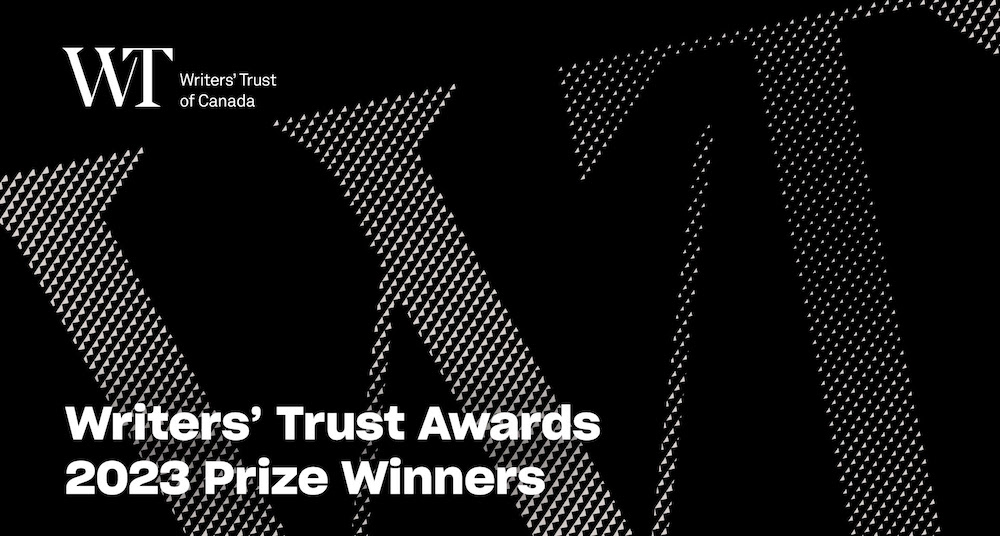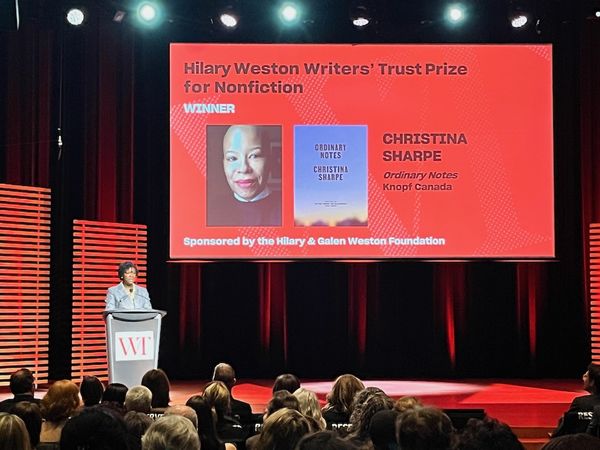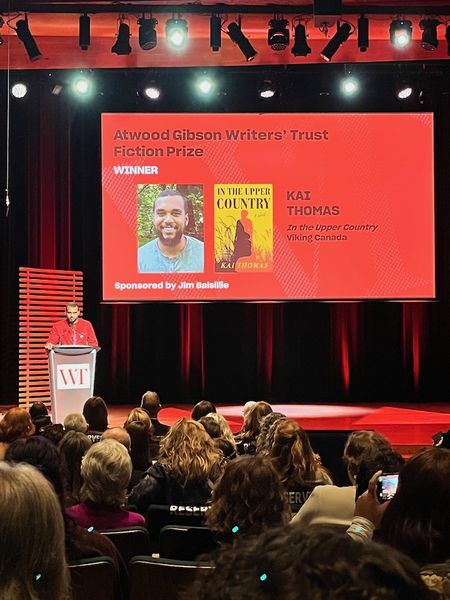The Writers' Trust Awards Over $300,000 in an Emotional Prize Ceremony, with More Good News for Anuja Varghese
Last night at CBC's Glenn Gould Studio in Toronto, publishers, writers, and industry professionals gathered for one of the most impactful nights in the Canadian literary calendar: the Writers' Trust Awards, which includes the presentation of seven of the country's most prestigious literary honours.
Hosted by journalist Rachel Giese, who won the Writers' Trust Shaughnessy Cohen Award for Political Writing in 2018 (an award that is presented at a separate ceremony in Ottawa annually), the event included emotional acceptances speeches from numerous winners, many of whom took the opportunity both to speak about the power of books and writing and to call for peace.
The ceremony kicked off with the awarding of the $10,000 Dayne Ogilvie Prize for LGBTQ2S+ Emerging Writers to Anuja Varghese for Chrysalis (House of Anansi Press). Varghese's debut has been met with widespread acclaim, and she was also awarded the Governor General's Literary Award for the same book just two weeks ago.
Next came the Matt Cohen Award: In Celebration of a Writing Life, a $25,000 body of work award aimed at celebrating writers who have dedicated themselves to their craft, which was presented to beloved, multi-genre Kingston writer Helen Humphreys.
The Vicky Metcalf Award for Literature for Young People was awarded to decorated children's writer Kyo Maclear. Like the Matt Cohen, it is a body of work award with a $25,000 prize purse.
Another $25,000 body of work award, the Writers’ Trust Engel Findley Award, which is focused on encouraging and rewarding outstanding writers in mid-career who work mainly in fiction, was awarded to Anosh Irani, who gave one of the most moving speeches of the evening, describing his experience of moving to Canada and feeling deeply isolated. He recalled how writing provided him with purpose, saying "[it was] a small miracle… I wrote one good sentence… and then a few weeks later, another."
The final body of work award of the night, the $60,000 Latner Griffin Writers’ Trust Poetry Prize, went to Laisha Rosnau, who shared another affecting and passionate speech, dedicating her award to a young family member recently lost to mental health and addiction issues.
The two most high profile awards closed off the evening: first, what has rapidly become Canada's most influential nonfiction prize, the $75,000 Hilary Weston Writers’ Trust Prize for Nonfiction.
Presented by Dan Werb, a writer and social epidemiologist who won the prize in 2022 for The Invisible Siege: The Rise of Coronaviruses and the Search for a Cure, the prize went to academic and poet Christina Sharpe for Ordinary Notes (Knopf Canada), which was praised by the jury for its "tenderness, bravery, and razor-sharp poetic language", in which Sharpe explores "the ordinary joys and sorrows of Black lives and how they are transformed within the everyday reality of systems of racial supremacy".
Sharpe was not able to be present at the ceremony, but her prize was accepted by acclaimed poet Canisia Lubrin, who referred to Sharpe as "a dear friend" and shared a brief statement from Sharpe. "We write to save our lives," she said, "we write to try to bring clarity...we write, even when we doubt that writing matters. But writing does matter.... We write against silence...We write through impossible rage and grief".
Your CanLit News
Subscribe to Open Book’s newsletter to get local book events, literary content, writing tips, and more in your inbox
Finally, the last award of the night was presented by one of its namesakes herself: Margaret Atwood took the stage to present the Atwood Gibson Writers’ Trust Fiction Prize ($60,000) to Kai Thomas for In the Upper Country (Viking Canada) .
Atwood spoke about her role as one of the five founders of the Writers' Trust, giving credit to her co-founder and late partner of 40 years, the writer Graeme Gibson, saying that it was his urging and spearheading of the initiative that convinced her to get involved. She spoke warmly and wittily of Gibson, calling him "a visionary idealist... [and] an impractical lunatic." She praised the supporter of the prize, philanthropist Jim Balsillie, as well, wryly saying that her father, to whom Atwood was famously close, would have liked Balsillie and considered him "quite a boy," adding, "that was high praise."
Thomas took the stage to accept his award for his incredible debut novel, which explores the enslavement of Black and Indigenous peoples in Canada, and spoke about the role of writing in an unstable and violent world. "[Sometimes] I really question the worthiness of spending my time doing this," he said, "[but] this type of art can—has to—increase our capacity for empathy."
For more information, including details about the other nominees for the prizes, jurors' comments, and more, explore the Writers' Trust website.





